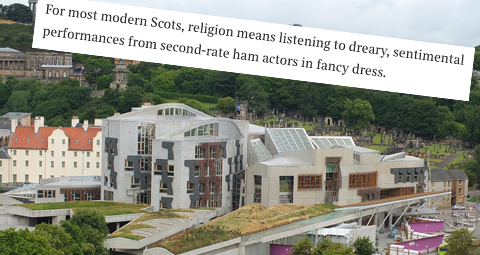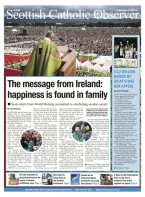BY No Author | April 27 2018 | ![]() 0 COMMENTS
0 COMMENTS ![]() print
print

Sectarianism working group slammed by Church and MSPs
Publication Date: 2018-04-27
Body tasked with defining anti-Catholicism has no representative from the Catholic Church and includes a member who once mocked clergy as ‘actors in fancy dress’ — By DANIEL HARKINS and PETER DIAMOND
A Scottish Government working group set up to define sectarianism has no representatives from the Catholic Church or the Irish Catholic community, and includes a member who once mocked clergy as ‘actors in fancy dress’ and who criticised the conviction of an anti-Catholic bigot.
Statistics released last year show that Catholics make up the majority of victims of religiously aggravated crimes in Scotland. However the new group, which is tasked with legally defining sectarianism, has no representative from the Catholic Church, despite having two Church of Scotland ministers on its panel.
MSPs have now called on the government to ensure the Catholic Church is represented on the panel, while the Catholic Church has accused the government of ignoring the reality of sectarianism in Scotland.
The suitability of one member of the group has also been questioned after it emerged he criticised an anti-Catholic bigot’s conviction as being anti-freedom of expression, attacked senior figures in the Church in Scotland on social media, and wrote mocking articles about Christianity.
Andrew Tickell, a law academic at Glasgow Caledonian University, is one of the seven members of the working group which will define sectarianism. In a 2016 article for The Times headlined: “Christian Scotland is lost without a prayer,’ Mr Tickell wrote: “For most modern Scots, religion means listening to dreary, sentimental performances from second-rate ham actors in fancy dress.”
Online posts
In 2011, he criticised a court’s decision to convict a bigot because the ruling was contrary to the man’s right to freedom of expression.
In October 2011, Stephen Birrell was jailed for eight months for posting religiously prejudiced abuse online, including the phrase, ‘Hope they all die. Simple. Catholic scumbags ha ha.’
Following the verdict, Mr Tickell wrote: “I for one cannot immediately fathom which of these statements the sheriff was willing to regard as a breach of the peace, or whether [the Sheriff] would hold that all four amount to ‘conduct severe enough to cause alarm to ordinary people and threaten serious disturbance to the community.’”
In the article, which was accompanied by a photo of a banner which read ‘f**k the Pope,’ he went on to give a list of scenarios where the highly offensive phrase could be used.
“Whether a robustly-worded protest against the actions or perceived actions of an individual pontiff, dissent from the Catholic hierarchy’s line on homosexuality, on contraception or abortion, there are a range of situations in which the acronym [FTP] Birrell used could reappear,” he said.
Mr Tickell was approached for comment but did not respond.
Elaine Smith, the Labour MSP for Central Scotland, has previously raised concern in parliament about anti-Catholic hate crime, and she called for a representative of the Catholic Church to be included on the new working group.
“It is completely inappropriate and unacceptable that a working group set up to explore sectarianism should include anyone who has expressed opinions in the way Mr Tickell has done,” she said. “The Scottish Government must think again about the membership of this group and at the very least include a representative from the Catholic Church.”
Coatbridge SNP MSP Fulton McGregor, who has also spoken out against anti-Catholicism, said his understanding was that ‘the membership of the group has not yet been finalised’ and he is ‘confident that the minister will ensure that all affected groups are represented as part of this review.’
Labour MSP Neil Findlay, while welcoming the setting up of the group, condemned the ‘glaring omission by not including a representative of the Catholic Church in Scotland.’
“Given the profile of religiously aggravated crime in Scotland this needs to be addressed before the group convenes,” he added.
Football act
The working group was set up following efforts to repeal the Offensive Behaviour at Football and Threatening Behaviour Act, which was thrown out on April 20. The new group seeks to: “Consider and weigh up the pros and cons of establishing a legal definition of ‘sectarianism’ in Scots Law, report the findings of these considerations to Scottish Ministers making clear recommendations on whether such a definition should be introduced and, if so, propose the text of such a definition.”
James Kelly, an MSP for Glasgow, led the campaign to repeal the offensive behaviour act.
He said he could understand how Mr Tickell’s comments could cause offence. “It reinforces the fact that the government should have properly consulted in order to ensure that people on the group will contribute appropriately,” he said. “I welcome the setting up of the group,” he added, “but the group’s representatives are too narrowly drawn and there doesn’t seem to be any consultation with the Catholic Church or the Irish community.
“There’s confusion around the definition of sectarianism and we need a proper, grown-up conversation with voices across the spectrum. The government just draws on the same people who will give the same answer.”
Mr Kelly said he would be writing to the government to call on them to widen the membership of the working group.
Catholic Conservative MSP Donald Cameron echoed that call. He said: “It is right that the SNP government establish a definition for sectarianism within the law, after parliament repealed its hated legislation relating to offensive behaviour at football matches.
“However, it is deeply concerning that they appear to have overlooked inviting a representative from Scotland’s second largest religious community, and they must rectify this immediately.”
Mr Cameron added: “It’s crucial that everyone has confidence in the working group, and the Catholic Church must be represented to achieve that.”
A spokesperson for the Church in Scotland said: “The Scottish Government could probably save a great deal of time and money in its search for a definition of the word ‘sectarianism’ by simply buying a dictionary.
“The decision instead to set up a working group on the subject seems like a calculated attempt to avoid the reality that over half of all religious hate crime in Scotland targets Catholics or Catholicism.
“The membership of the group seems to have been chosen to ignore this reality.”
The committee has also been criticised by Irish groups in Scotland for not including any members from that section of society.
“If a working group has been created to look into sectarianism then as the group which has consistently been the biggest target of sectarian aggravation, according to Scottish Government statistics, then the Irish community must be involved in these discussions,” Paddy Callaghan of Irish cultural group Comhaltas Ceoltóirí Éireann told The Irish Voice.
Asked if the Scottish Government consulted the Catholic and Irish communities before setting up the working group, whether they would now consider altering the make-up of the group, and whether Andrew Tickell was an appropriate appointment, a Scottish Government spokesperson said: “We would encourage all those wishing to contribute to the work to develop a legal definition of sectarianism to take the opportunity to do so by engaging with the independent group.
“Its members were brought together because of work that they have been involved in across communities and faiths, or because of the expertise they can bring to this important task. Their role is to consider all perspectives on this issue to shape the development of a definition.”
The group’s full membership is: Professor Duncan Morrow from University of Ulster; Alison Logan, Sense Over Sectarianism; Andrew Tickell, Glasgow Caledonian University; Margaret Lynch, Margaret Lynch Consulting Ltd; Rev Ian Galloway, Faith in Community Scotland; Rev Ruth Harvey, director of Place for Hope; and Dr Michael Rosie, University of Edinburgh.











